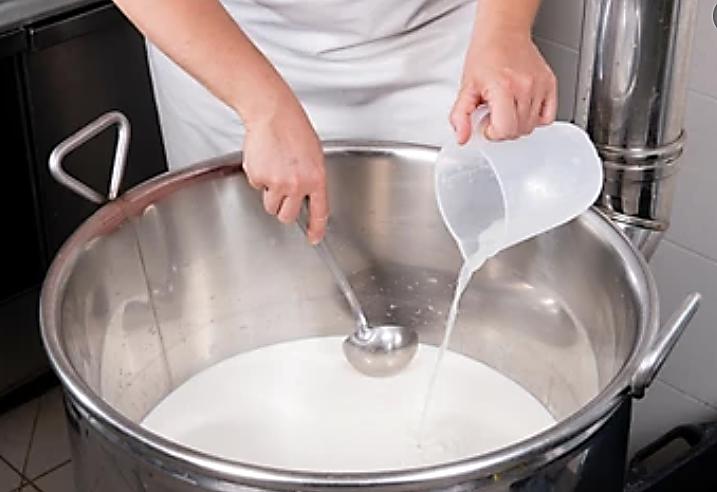Chymosin and pepsin are rennets that are essential enzymes involved in the cheese-making process. Lifeasible offers services to help determine rennets' activity and test for bovine chymosin and pepsin contents that affect total milk-clotting activity.
The rennet has milk-clotting activity. The addition of rennets to the cheese-making process facilitates milk sedimentation. Animal rennets are often added, including bovine, ovine, and caprine rennets. Pepsin is more pH-dependent and has a more general protein hydrolytic activity than chymosin. The ratio of chymosin to pepsin is higher in the abomasa of young milk-fed calves than in adult calves. It is essential to analyze the content of chymosin and pepsin when rennets come from the bovine's abomasa. In addition, bovine, ovine, and caprine rennets have their characteristics, and they differ in temperature and pH sensitivity. Thus, it is also essential to determine the activity of rennets from different animals. Lifeasible offers professional testing services to help determine rennet content and activity. Our services meet national standards.
 Fig. 1 Cheesemaker pours rennets into milk.
Fig. 1 Cheesemaker pours rennets into milk.
Determination of the total milk-clotting activity of bovine rennets
The method applies to samples of bovine rennet containing only bovine chymosin and pepsin and to samples of bovine chymosin produced by fermentation.
This method determines the total milk-clotting activity of bovine rennet on a standard milk substrate at pH 6.5. Prior to the assay, it is necessary to determine whether the sample contains rennets of non-bovine origin.
Operation flow:

Main reference standard:
ISO 11815:2007
Determination of bovine chymosin and pepsin contents
The method is based on chromatography to determine bovine chymosin and pepsin contents, which is adapted to samples of calf rennet, adult bovine rennet, and their mixtures with fermentation-produced bovine chymosin.
Chymosin and pepsin are separated from the rennet samples based on an anion-exchange column. Subsequently, the milk-clotting activity of both enzymes is determined separately. The enzymatic composition of the rennet sample is expressed as the sum of the percentage of chymosin activity and pepsin activity, or milligrams per liter of active chymosin and pepsin.
Operation flow:

Main reference standard:
ISO 15163:2012
Determination of the total milk-clotting activity of ovine and caprine rennets
The method applies to samples of an ovine or caprine rennet containing only chymosin and pepsin as the active coagulating enzymes. This method determines the total milk-clotting activity of rennet on a standard milk substrate at pH 6.5.
Since there are no reference standard methods to characterize and isolate ovine and caprine rennets, the method tests for the milk-clotting activity of ovine and caprine rennets follow the same specifications as for bovine rennets. It is measured relative to a reference standard with 75% calf chymosin and 25% bovine pepsin.
Operation flow:
The operation flow of the method is like the operation flow of determining the total milk-clotting activity of bovine rennets.
Main reference standard:
ISO 23058:2006
Determination of the total milk-clotting activity of microbial coagulants
Microbial coagulants/rennets have successfully challenged rennets from animal sources. Microbial coagulants are less expensive and have a long shelf life. We help determine the total milk-clotting activity of microbial coagulant samples and compared them to an international microbial coagulant reference standard on a standard milk substrate prepared with a calcium chloride solution of concentration 0.5 g/L (pH ~6.5).
Operation flow:
The operation flow of the method is similar to the operation flow of determining the total milk-clotting activity of bovine rennets.
Main reference standard:
ISO 15174:2012
For sample delivery, samples need to be stored in a dark environment at temperatures between 0°C and 5°C.
If you are aware of the situation of rennets present in your sample, please let us know at the time of sample delivery. This will facilitate determination.
Lifeasible specializes in milk-related testing and offers services to help determine the milk-clotting activity of rennets. Please contact us for professional services.
References
Lifeasible has established a one-stop service platform for plants. In addition to obtaining customized solutions for plant genetic engineering, customers can also conduct follow-up analysis and research on plants through our analysis platform. The analytical services we provide include but are not limited to the following:
July 13, 2024